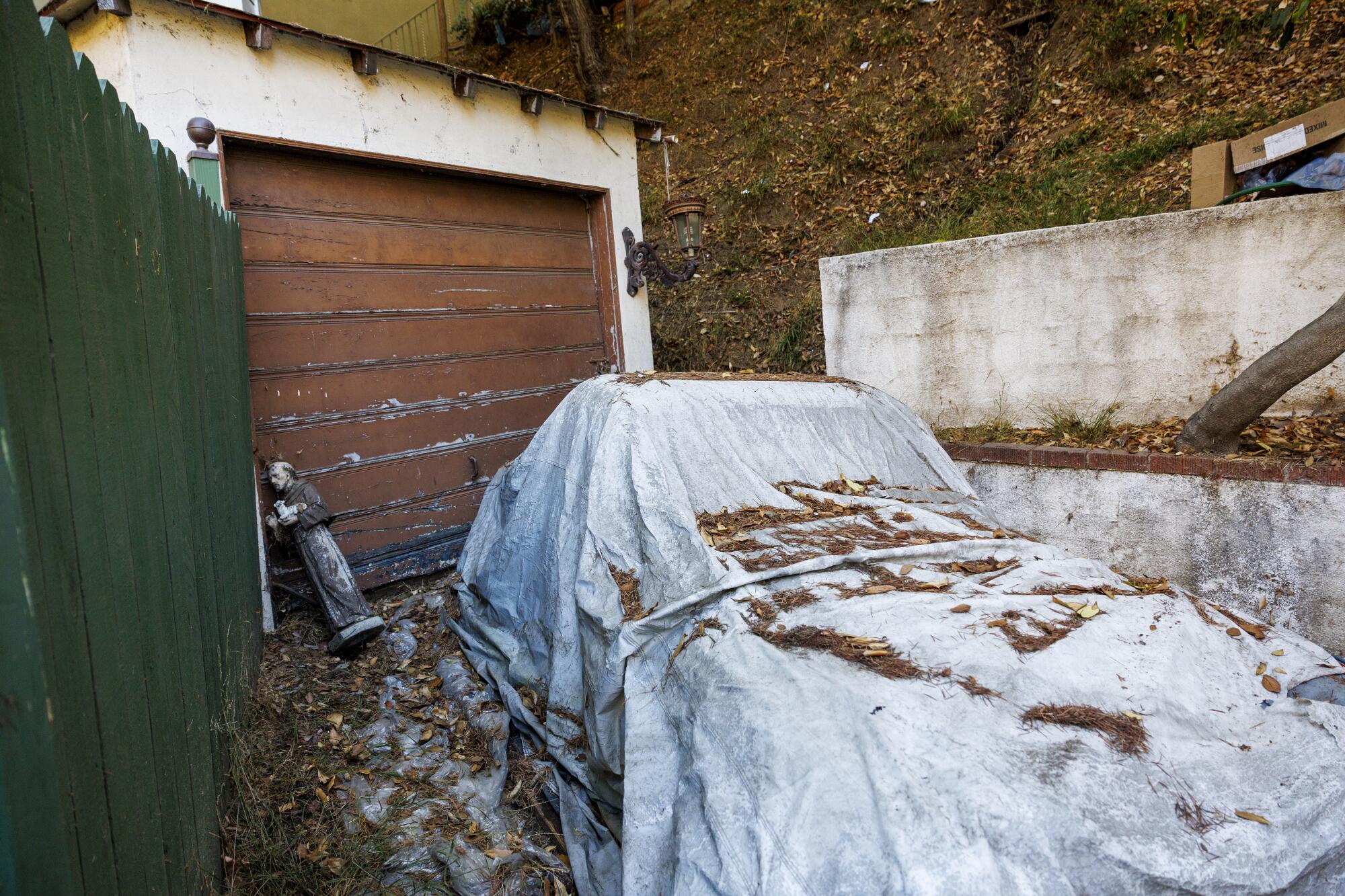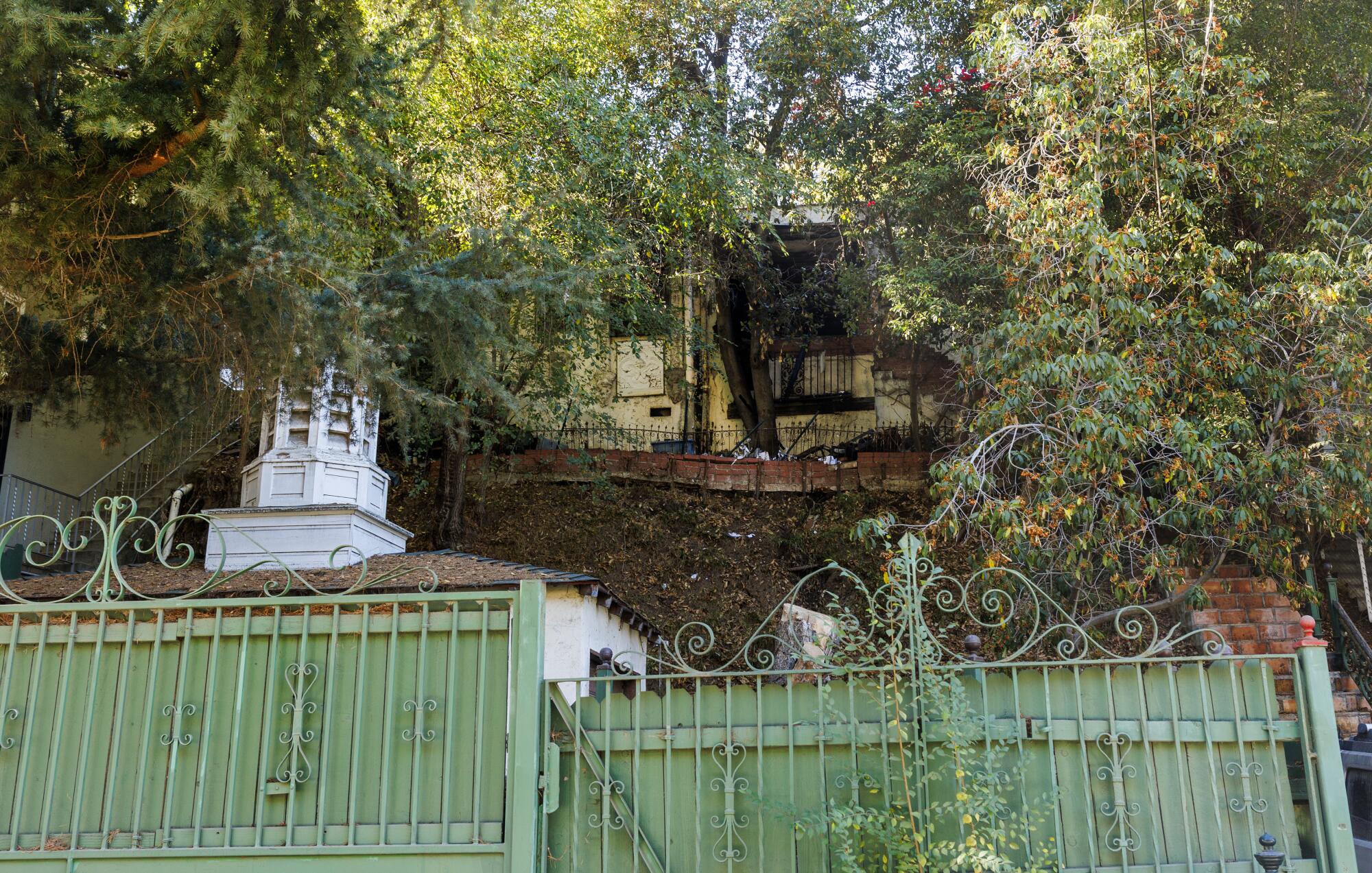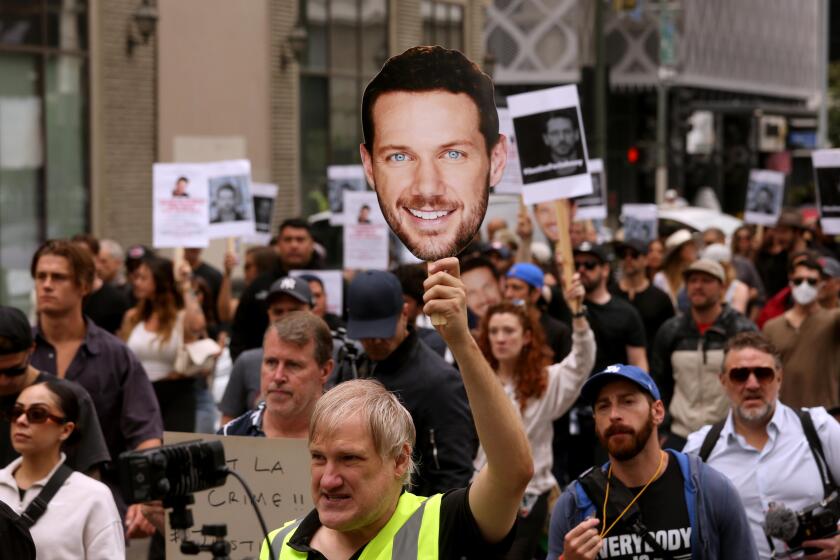
- New details about the life of William de Rothschild, who died Nov. 27, cast doubt on claims that he was a member of Europe’s eminent Rothschild banking family.
The elderly man told his neighbors he was a Rothschild — a member of the prominent European family whose collective fortune is worth billions of dollars. He certainly appeared to have some of the trappings of a descendant of the esteemed bankers, including a classic car collection featuring Ferraris and Jaguars.
But in the days after William de Rothschild, 87, was found dead at his fire-damaged Laurel Canyon home last week, questions surfaced about his identity. He was not born with that name and does not appear in the official genealogy maintained in the archive of the Rothschilds.
A court filing may explain how he became a Rothschild: by making himself one.
It wouldn’t be the first time. The Jewish dynasty, originally from Frankfurt, Germany, has long dealt with impostors trying to inflate their status with the name.
In 1985, a man named William Alfred Kauffman petitioned Los Angeles County Superior Court to change his name to William Alexander de Rothschild.

“I want to take my family name, that I prefer to Kauffman, it would simplify my life greatly, taking the name from my mothers side,” he stated in the legal filing. The case file, which includes his address on Lookout Mountain Avenue, indicates there was “no one objecting” to the petition, and a judge soon granted it.
The name change — and De Rothschild’s death — was news to his younger brother, Richard Kauffman of Oregon. Reached by telephone, he told The Times that his brother had “disappeared” in the 1960s or 1970s and was presumed dead long ago. He said that he knew of no family connection to the Rothschilds, and that he and his kin were not Jewish.
“My brother is not a Rothschild, as far as I know,” said Kauffman, 78.
“It’s odd, because I thought he had died years ago, because he disappeared,” he continued. “[There had been] no contact with my parents, who were getting older. It’s a strange feeling.”
De Rothschild’s body was found after the Los Angeles Fire Department responded to a blaze at his Lookout Mountain Avenue residence on Nov. 27. The cause of the conflagration, which was put out by 45 firefighters in a little more than 30 minutes, is under investigation by the Los Angeles Police Department and the Fire Department.
The Times could not verify other details about De Rothschild that neighbors had shared in interviews last week, including his supposed donation of a cache of cars to L.A.’s Petersen Automotive Museum. A Petersen representative said there was no record of any of De Rothschild’s vehicles ever having been lent or given to the museum.
A neighbor who had known De Rothschild for many years told The Times he was surprised by the incongruous findings. The man, who requested his name not be disclosed due to privacy concerns, said Rothschild “came off as genuinely educated” and “very polite.”

“He carried himself like I think a Rothschild would,” said the neighbor, who added that over roughly a decade he had seen about 50 of Rothschild’s classic automobiles, ranging from European grand tourers to American muscle cars. “The money is there, whether it is Rothschild money or not.”
Kauffman said that he remembered his brother liking cars, and could envision him taking liberties with the truth.
“I could see him taking the Rothschild name,” he said.
The ‘aura’ of a famed name
William Kauffman was born in Colorado in 1937, but his family soon moved to Salem, Ore., where attended North Salem High School, graduating in the mid-1950s, his brother Richard said.
Being nine years apart, he said, they weren’t particularly close as children. Still, he remembered his sibling as a gifted artist who painted and sculpted. He was also something of an enigma.
“My brother was kind of a mysterious character when I knew him,” Kauffman said.
After high school, his brother went to the University of Oregon, Kauffman said, and then left the state in the 1960s or ’70s. By 1972, the man who would become William de Rothschild had bought the Lookout Mountain house, which was situated in an artsy enclave then famed for its musician residents, including Neil Young, Joni Mitchell and “Mama Cass” Elliot.
Kauffman said he had spoken with his brother on only one occasion after the latter left Oregon. At some point in the ’70s or ’80s, Kauffman said, his brother telephoned him for a brief chat. It was a “very odd” call.
“He didn’t explain where he had gone. I was very surprised. ... I told him he should get in touch with our parents because they were getting a little bit older,” he said.

De Rothschild’s neighbors believed he was a wealthy man, but his residence gives little sense that it once was a glamorous canyon abode. Described by a real estate listing service as an 825-square-foot, two-bedroom property worth about $1 million, it is now burned-out and bedraggled. The house, accessed by a long set of tiled stairs, looms over the roadway from behind a tall green gate.
A Los Angeles County Medical Examiner‘s representative said Tuesday that the process of identifying the deceased man’s body was ongoing. The office will also determine the cause of death.
Mike Rothschild, author of “Jewish Space Lasers: The Rothschilds and 200 Years of Conspiracy Theories,” said that in the past, Rothschild impostors “have definitely done it for money or clout, given the aura that the name still has.”
The elderly man’s body was discovered after his home on Lookout Mountain Avenue burned Wednesday afternoon.
The Rothschilds long dominated European banking, with the family’s English and French branches playing major roles in finance and politics, most notably during the 18th and 19th centuries. At one point, the Rothschilds were widely considered to have amassed the largest private fortune on Earth.
“There’s an assumption that anyone named Rothschild has access to unlimited amounts of money and power, and it attracts both grifters and people who want to get into those circles,” said Rothschild, the author, who is not related to the family. He first noted in a post on his website that William de Rothschild did not appear in the family’s genealogy. “Why the fire victim might have used the name is still a mystery.”
Indeed, there is no evidence that De Rothschild used his identity publicly to seek fame or fortune. But there have been a handful of notable Rothschild impostors over the years, including Inna Yashchyshyn, who posed as Anna de Rothschild while visiting Mar-A-Lago in 2021.
While there, the Ukraine-born Yashchyshyn, who speaks Russian, met Donald Trump and his friends and family, according to a report by the Pittsburgh Post-Gazette and the Organized Crime and Corruption Reporting Project.
A notable automotive family
William de Rothschild’s interest in cars may have blossomed in marriage.
According to public records, he married Margaux Mirkin in Nevada in 1999. She is a daughter of the late Morris Mirkin, founder of Budget Rent-a-Car.
A Times story from 1985 said that the younger Mirkin operated Budget’s “Drive A Dream” facility in Beverly Hills, where high-end vehicles including Mercedes-Benzes and Rolls-Royces could be rented.
“People come here to express themselves, and drive a dream,” she said. “They park their Chevy and see Hollywood like the stars. ... I have the most beautiful cars in the world here.”
Five years later, a Times report about the secondhand clothing trade described Mirkin as “a serious collector, designer and restorer of vintage clothing.”
“I’m lucky enough to find people who respect what I buy,” she said in the 1990 piece.
Curiously, several Lookout Mountain residents have told The Times that they knew Mirkin as Rothschild’s cousin or sister — and not his wife. Her name is associated with a property up the street from Rothschild’s house, public records show.
Mirkin did not respond to interview requests. Kauffman said he did not know of Mirkin or the marriage.
The discordant details left Rothschild’s longtime neighbor curious to know more. “All of the neighbors would want some closure,” he said.
The resident said that Rothschild seemed happiest when discussing his automobile hobby: “He was for the most part a pretty lonely older man. The only thing that would excite him was when cars came up.”
As far as Kauffman knows, De Rothschild never reconnected with their parents, both of whom are now dead. He said he was sad to learn of his brother’s death, but also heartened to learn some of the details of his L.A. existence.
“He probably lived a long and interesting life,” Kauffman said.
Times researcher Scott Wilson contributed to this report.
More to Read
Sign up for Essential California
The most important California stories and recommendations in your inbox every morning.
You may occasionally receive promotional content from the Los Angeles Times.












